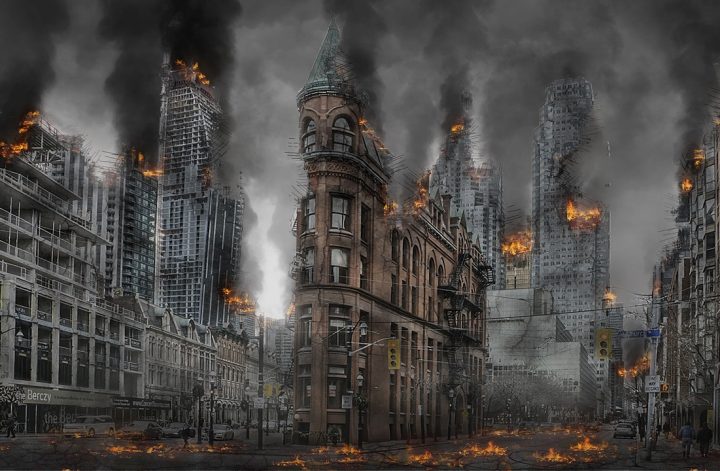Brief Background of the Russia-Ukraine War- When and Why:
The international conflict between Russia and Ukraine has been going on since 20th February, 2014.
On 24th February 2022, in a major escalation of the war, Russia invaded Ukraine and occupied parts of it.
The reason that prompted Russia to act this way is because Russia wanted Ukraine to integrate into a Single Economy lead by Russia. However, several problems arose including the Ukrainian bid to join NATO amidst the growing gas disputes. Ultimately, to prevent Ukraine from joining NATO and losing energy resources, Russia invaded Ukraine and effectively launched an intense war never seen before since WWII.
The Russo-Ukrainian War and Its Impact On Climate Change:
The ongoing conflict not only gives rise to great political instability but also paints a grim picture for the climate scenario. Certain Ukrainian cities like Kyiv and Vaylkiv are one of the most energy rich regions with abundant resources of gas, oil and petroleum. They are also the site of extensive war damage and as a result have high levels of air pollution from war debris, food insecurity, water pollution and scarcity, as well as radiation.
The city of Donbas in Eastern Ukraine is already seeing adverse effects on the people due to toxic metal contaminating the water sources, destruction of water ways and pipes leading to water scarcity as well as toxic fumes in the air that causes many negative health effects and respiratory problems.
Impacts of Russia-Ukraine War on Environment:
Some of the impacts of the war have been briefly discussed below:
- Air Pollution and Global warming: The ground explosions, bomb-felling and general detonation in the Ukrainian regions have further deteriorated the air quality of some Ukrainian cities that were hard hit by the war. Ukraine’s air quality was already quite poor due to the already polluted air as a result of heavy industrial emissions in these energy rich regions where energy production took place.
Moreover, the current conflict has further aggravated and contributed to the extensive, uncontrollable wildfires in the surrounding forests that have worsened the air quality causing respiratory ailments. Of course, the burning of trees has also lead to the release of carbon from them effectively rendering the climate more prone to warming due to the release of CO2- a green house gas.
Due to extensive shelling, missiles and military weapon usage the air quality is being severely degraded. People are being forced to inhale a harmful mixture of mine toxins, fumes, Particulate matter along with asbestos from building debris which is carcinogenic that causes asbestosis. - Green House Gas Emissions: The cities being bombed have a high number of industries, factories and underground mines for extracting coal, petroleum, gas and using them to produce energy. The Russian bombing has caused the destruction of these mines of fossil fuel reserves leading to extensive damage as well as emission of GHG’s.
The high number of abandoned mines as well as open mines being bombed has caused the greenhouse gas emissions of methane and CO2. Methane is generated at the same time coal is formed. Thus, the bombing causes the release of this methane gas into the atmosphere where it acts as a potent GHG which has a warming effect 4 times stronger than that of CO2. This proves to be very dangerous for our climate change mitigation efforts. - Land Degradation: As the mines are hollow from within due to extraction of fossil fuels, they are vulnerable to collapsing if pressure is put on them due to lack of stability. The bombs striking the surface of these mines provides enough pressure on the surface to cause the mines to collapse into themselves. This leads to release of potentially more methane but also causes other impacts and threats such as landslides for nearby settlements, long term land degradation and leaching of toxic metals to the surface that are usually present in mines. Along with destruction of major buildings, parks and industries, the explosions have also laid waste to swaths of farmlands possibly leaving them irreparable for a long time. Read: Soil and Land Degradation- Causes, Effects and Solutions
- Water Pollution: The leaching of heavy metals from mines may cause heavy metal contamination and lead to water scarcity as it may enter drinking water sources. The explosives used contain TNT, lead, Arsenic and Mercury which not only cause further water and soil pollution but on direct contact where the heavy explosions detonate; they may contaminate the land long term. The people of Ukraine are already suffering the consequence as the water ways and drinking water have been heavily polluted by oils, building debris, heavy metals and other toxic pollutants.
- Radiation and Health Effects: Th deadly combination of wildfires, land degradation, water and air pollution will have severe health impacts on the health of the Ukrainian population of those regions. It is estimated that in future their population will see a decline in the birthrates due to reproductive and genetic diseases that the people are being predisposed to. The effects of this war coupled with the already fragile radioactive zone nearby (Chernobyl) will inevitably lead to people suffer from severe health effects including increase in the ratio of children being born with birth defects, neuro-skeletal disorders, neuro-developmental problems, along with skin and respiratory problems.
Read: Disastrous Environmental Impacts of Radioactive Waste
CONCLUSION:
Recent reports state that the war has lead to the emission of 33 million tons of GHG’s. With every passing day, the natural reserves of fossil fuels in Ukraine continue to be a source of military operation and destruction that will degrade the environment rapidly.
The amount of CO2 and Methane gas along with toxins from explosions, missiles and shelling etc. are serving to deteriorate the region and landscape severely and it will take a long time to restore them back especially as the effects of Chernobyl are still being suffered from generation to generation.
Thus, until this war ends, the climate continues to be negatively effected and all our global efforts for climate change mitigation suffer too since the emissions from the war are simply too great in the aftermath.
Check Out: Top 15 Countries With Worst Environmental Degradation
10 Initiatives Government Need to Take To Control Climate Change and Environmental Degradation
Related: 10 Major Environmental Disasters in The World
We hope you liked this post! Please comment below if you have any suggestions, comments or feedback! We at #envpk love hearing from readers! Thanks




